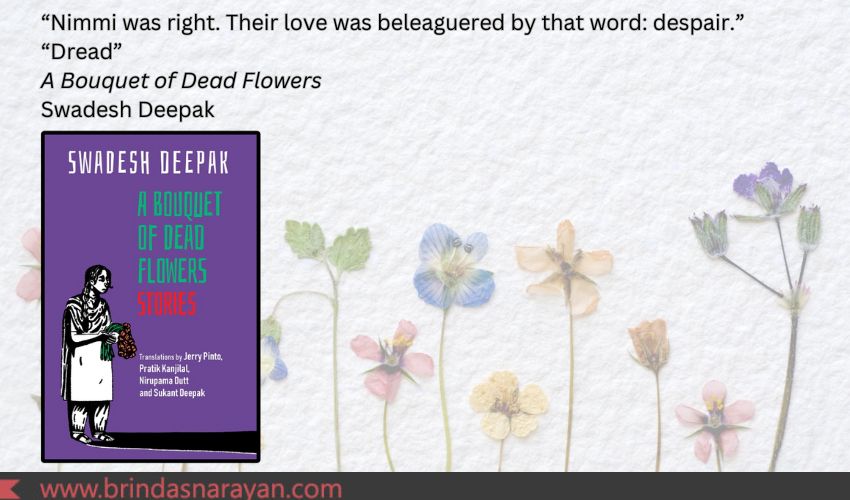
Exploring Desire and Despair in Swadesh Deepak’s Stories
Feral Winds, Creeping Despair
In “Dread” and “Hunger”, two stories in A Bouquet of Dead Flowers, the Hindi writer Swadesh Deepak explores the unsettling intertwining of desire and deprivation. And of predatory instincts that simmer in situations marked by unequal power relations. Both stories are haunted by a deep sense of dread. Jerry Pinto, one of the translators of this collection, terms Deepak’s style, “neo-Gothic,” replete with whistling, “guerilla” winds that can stroke cheeks or rip lives apart, just as gentle zephyrs turn into twisty typhoons.
It’s not just dread that pervades these narratives, but also hunger. In one, the gnawing, physical hunger experienced by the desperately poor, in the other, the emotional hunger of a well-heeled man, whose life feels hopelessly constrained.
Turbulent Shadows
In “Dread”, Naveen, a middle-aged man, is entangled in an affair with Nimmi, a much younger woman who simultaneously mocks and seduces him. The relationship is shot with tense energy as Naveen oscillates between desire and helplessness. He doesn’t lack anything in material terms, but feels fettered by choices made for him—by his dead father who shuttered his career, and by his wife, a ruthless Sessions Judge, who has drifted into her own world of power and violence. He has a daughter too, Sunita, and Nimmi, like a forbidden cliché, is her young teacher.
Naveen’s fling with Nimmi is an escape from and a reflection of his inner turmoil. While Nimmi flits between affection and anger, between laughter and tears, she represents a freedom that Naveen craves but can never attain. The dark, sullen house where they meet mirrors the emotional void in his life, and the creeping dread that defines his existence. Thoughts of his wife, a woman who once seemed beautiful but whose “evil spirit” now repels him, casts a shadow over his actions.
Inflicting Wounds With Words
There are allusions to language politics, to the emasculation of the nation’s psyche by English-speaker yearnings, to imposed differentials between the wordy and the illiterate. Naveen loved reading Hindi novels, but his father castigated him for doing so. Why, the father asked, was he paying for an expensive education if his son turned to such “sissy” material? Naveen’s first fight with his wife is over this. When reading at the dining table, she asks him not to. He persists and she scoffs when she discovers that it’s a Hindi novel. His father supports her, agrees that Naveen does not care sufficiently about his standing.
With his wife and father aligned in belittling him, Naveen starts hating her. His uneducated but all knowing mother warns him not to argue with the judge. The wife, she warns, is too deft with words, he would never win. Their relationship is violent, with even their physical interactions scarred by “bloody sores” on his body.
Themes of control ripple through Dread—Naveen’s wife, who boasts of executing people, wields her gavel over him. He’s filled with a growing realization that having everything can sometimes make one “helpless.”
Gnawing Hunger, Unshakeable Dread
In “Hunger”, we encounter a much starker reality, but the dread lingers, this time more visceral. A young boy, hungry and desperate, roams the railway station in search of food, fervently watching for someone to discard leftovers. His hunger gnaws at him, physically and emotionally. He lives in a world of constant deprivation, where even the most basic needs—food, safety—are not guaranteed.
His attempts to gather food are met with cruelty and exploitation. Policemen stationed at the godown where he hopes to collect grain are maliciously kind. They ask him to fetch his sister, and even his knowing mother dispatches her too-young daughter. Survival can be grim and brutal. Dread seeps into everything—the boy, his sister and mother are trapped in a world where hunger, exploitation, and violence intersect. When their stomachs are briefly filled, the cost is tremendous.
In both stories, hunger — in Naveen’s yearning for emotional fulfillment or the boy’s perilous foraging for food — remains insatiable. Laws of the jungle prevail, in the animal dynamics between Naveen and his wife, or in the horrific abuse of the boy and his sister by the policemen. Evoking the terrifying emptiness of human experience, Deepak suggests that in certain worlds, satisfaction always eludes, and dread is an abiding companion.
References
Swadesh Deepak, A Bouquet of Dead Flowers: Stories, Translated by Jerry Pinto, Pratik Kanjilal, Nirupama Dutt and Sukant Deepak, Speaking Tiger, 2024




